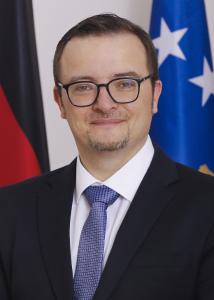The publication comprises a theoretical analysis and a public opinion survey, aiming to shed additional light on these two aspects of the recent history of the state.
The public opinion survey was conducted in August 2022.
The sample size includes 1111 respondents, maintaining the general ratio in terms of basic demographic characteristics (gender, age over 18 years, ethnicity, profession, and education) while respecting the appropriate geographic balance.
During the implementation of the research, a quantitative research methodology of data collection was used (via a telephone survey), which enables a reliable and precise scanning of the attitudes of the general population.
The margin of error ranges from +/- 2.9% with a 95% confidence interval.
The survey was conducted by the Institute for Political Research (IPIS).
The questions can be divided into six groups:
General questions that aim to determine the general attitudes of the respondents about the foreign and defence policy of the state, as well as about the institutions that are in charge of their implementation;
Questions that determine the views of the respondents about the persons who were elected presidents of the country in the past three decades, because the conduct of foreign and defence policy are key competencies of this institution;
Questions related to the European and Euro-Atlantic integration;
Questions related to the state's relations with other important states in the neighbourhood and the world;
Questions related to some of the current challenges in foreign and defence policy;
Questions related to the future of North Macedonia.
Based on the survey results, the following more characteristic conclusions can be drawn:
Regarding the state’s conducting of foreign policy and the professionalism of the Army over the past three decades, the average score of the respondents on a scale from 1 to 5 is 2.52, i.e., 3.37, respectively. The visibly higher rating for the Army compared to the conducting of foreign policy can be attributed to North Macedonia's membership in NATO.
45.6% of respondents believe that North Macedonia has failed to build a professional diplomatic service over the past three decades (against 21.8% who have the opposite opinion). Contrary to this, 57.8% positively assess the role and achievements of the Army (against 24.7% who have the opposite opinion). The conclusion is that there is visibly more trust in the Army and the institutions responsible for defence compared to the diplomatic service.
Regarding the management of foreign policy and defence, from all the presidents of the country, on a scale of 1 to 5, the respondents rated the second president, Boris Trajkovski, with the highest average score of 4.28. The first president of the independent Republic of Macedonia, Kiro Gligorov, has an average score of 4.1, the third president, Branko Crvenkovski, has an average score of 3.02, and the average score of the fourth president of the country, Gjorge Ivanov, is 3.11, while the current president, Stevo Pendarovski, has an average score of 2.81.
64.2% of the respondents support the membership of North Macedonia in NATO, which represents a ratio of 2:1 in favour of the supporters. In addition, 56.2% of the respondents believe that North Macedonia is safer and more stable with NATO membership.
62.8% of the respondents are in favour of North Macedonia’s membership in the EU. Although this percentage is still very high, clear negative trends are visible compared to the first two decades of independence.
Cumulatively, 40.2% of the respondents consider domestic weaknesses as the reason for the country's failure to join the EU, compared to 19.2% who find the reasons in external factors.
Respondents have the most positive impressions of the quality of mutual relations between North Macedonia and Turkey, with 71.6%; Serbia, with 68.6% and Germany, with 64.3%.
The most negative impressions are about interstate relations with Russia and Bulgaria, for which 59.3% and 52.5% of the respondents consider that they have bad bilateral relations with North Macedonia.
57.1% of the respondents reject the so-called "French proposal" which was a prerequisite for lifting Bulgaria's veto for the start of North Macedonia's negotiations with the EU, as opposite to 27.2% who accept it, which represents a difference of approximately 30% in favour of the opponents of this document. Macedonian-Bulgarian relations are at a low level, which can have a negative impact on the quality of elementary communication between the institutions and societies of the two countries.
Concerning Greece, 36.5% of the respondents have stated that they support the Prespa Agreement; 30.6% of the respondents believe that after overcoming the name dispute, Macedonian-Greek relations have had a visible improvement; 30% of the respondents have stated that they consider the resolution of the name dispute have had a positive impact on the decision of the Ecumenical Patriarchate to recognise the canonical status of the Macedonian Orthodox Church – Archdiocese of Ohrid on 9 May 2022. Macedonian-Greek relations are characterised by a positive dynamic, although there is still marked restraint.
64.6% of the respondents consider Germany a strong political supporter and ally, and 66.6% believe that it is also an important economic partner of North Macedonia. Germany together with the USA are the two more characteristic examples of a continuous, stable trust regarding the quality of the relations that these countries have with North Macedonia.
Regarding the perceptions of which country is the biggest ally of North Macedonia, 37.4% think that it is Serbia, 24.1% do not have an answer, while 19.8% think that it is the USA. Bellow at this table of allied countries is Turkey, with 5.8%, as well as Germany, with 5.4% of the respondents considering these countries to be North Macedonia's greatest friends.
Regarding which country is the biggest enemy of North Macedonia, 44% of respondents think that it is Bulgaria, while 12.1% think that it is Russia.
50.4% of the respondents believe that the Russian military aggression against Ukraine is unjustified and unacceptable, while 26.2% believe that it is justified and acceptable, which represents a ratio of 2:1 in favour of the first group.
65.7% of the respondents support the "Open Balkans" project, while 15% do not support it, implying that the number of respondents who support this form of closer cooperation between North Macedonia, Albania and Serbia is for 50.7% higher.
To the question when North Macedonia would join the EU, 28% of the respondents have answered that it will never happen, which is the largest group, while 23.7% have expressed their pessimism by answering that they do not know when it will happen, i.e. that they have no answer. In opposition to these groups are the more optimistic respondents. Thus, 7.4% have stated that the country's membership in the EU will happen in 20 or more years, 10.4% in 10-20 years, 15.5% in 10 years and 13% in 5 years. From the respondents’ answers, deep pessimism is visible regarding North Macedonia's membership in the EU, as well as about the speed of achieving this strategic goal. Overcoming the bilateral obstacles and opening a clear perspective for the dynamic integration of North Macedonia without additional delay would certainly result in amending the citizens’ impressions in a positive sense in relation to the Union itself, as well as in relation to the time for obtaining the membership.










